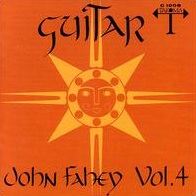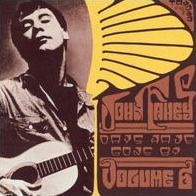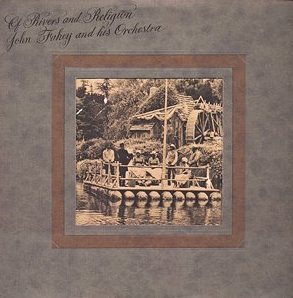
The Voice of the Turtle is the seventh album by American guitarist John Fahey. Recorded and released in 1968, it is considered one of his more experimental albums, combining not only folk elements, but shreds of psychedelia, early blues, country fiddles, ragas, and white noise. The album had many reissues with various track listings, jacket designs and mismatched titles.

The Yellow Princess is the ninth album by American folk musician John Fahey. Released in 1968, it was his second and last release on the Vanguard label.

Death Chants, Breakdowns & Military Waltzes is a 1963 album by American fingerstyle guitarist and composer John Fahey. Various sources show either a 1963 or 1964 original release. It was Fahey's second release and the first to gain a national distributor.

Fare Forward Voyagers (Soldier's Choice) (or simply, Fare Forward Voyagers) is an album by American fingerstyle guitarist and composer John Fahey, released in 1973. It contains three songs, one comprising a complete side of the original LP.

The Great San Bernardino Birthday Party & Other Excursions is an album by American fingerstyle guitarist and composer John Fahey, released in 1966. The cover simply labels the album Guitar Vol. 4 while the liner notes label it The Great San Bernardino Birthday Party & Other Excursions. The title never appeared on the record labels themselves. It marked the beginning of Fahey's interest in his recording of experimental soundscapes and sound effects. Despite Fahey's distaste for the 1960s counterculture, it is his release most often referred to as psychedelic.

Days Have Gone By is an album by American fingerstyle guitarist and composer John Fahey, released in 1967. The cover labels the album Volume 6 while it was preceded in 1966 by The Great San Bernardino Birthday Party which is labeled Guitar Vol. 4.

America is an album by American folk musician John Fahey, released in 1971. Originally intended to be a double album, it was released as a single LP. The unreleased material was subsequently restored in later CD and vinyl reissues.

Of Rivers and Religion is an album by American folk musician John Fahey, released in 1972. It was his first recording on a major label and is credited to John Fahey and His Orchestra. It marked a significant change from Fahey's previous releases, incorporating a backing band and performing songs and arrangements in a Dixieland jazz style. Although Time picked it as one of the Top Ten albums of 1972, it was also a difficult album to market and had little enthusiasm at Reprise.

After the Ball is an album by the American folk musician John Fahey, released in 1973. It was his second and last recording on the Reprise label and like its predecessor, Of Rivers and Religion, it sold poorly.

The Best of John Fahey 1959–1977 is a compilation album by American fingerstyle guitarist and composer John Fahey, released in 1977. The songs are collected from four of Fahey's dozen or so releases up to that point.

Christmas with John Fahey, Vol. II is a Christmas album by American fingerstyle guitarist and composer John Fahey, released in 1975.

I Remember Blind Joe Death is an album by American fingerstyle guitarist and composer John Fahey, released in 1987.

God, Time and Causality is an album by American fingerstyle guitarist and composer John Fahey, released in 1989.

Rain Forests, Oceans and Other Themes is an album by American fingerstyle guitarist and composer John Fahey, released in 1985.

City of Refuge is an album by American fingerstyle guitarist and composer John Fahey, released in 1997. It was his first original release in over five years and helped start his career resurgence.

Red Cross is the 33rd and final studio album by American fingerstyle guitarist and composer John Fahey, released posthumously in 2003. The Revenant Records catalog refers to the album's title as Red Cross Disciple of Christ Today.

Live in Tasmania is a live album by American fingerstyle guitarist and composer John Fahey, released in 1981. It was his first live album release after 18 albums.

Let Go is an album by American fingerstyle guitarist and composer John Fahey, released in 1984. It was his first release on the Varrick label after over 25 years on his own label Takoma, as well as a few releases on other labels.

Jam 1980's is the 46th studio album by American musician James Brown. The album was released in March 1978, by Polydor Records and arranged by James Brown with Sweet Charles Sherrell arranging "Nature".

I'm Back is the 57th studio album by American musician James Brown. The album was released on November 17, 1998, by Mercury Records.




















